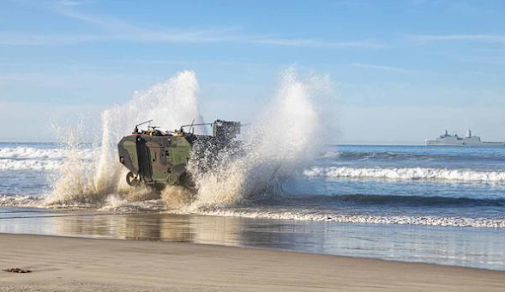The US Marine Corps (USMC) will temporarily limit the operation of its new amphibious combat vehicle – the 8×8 Amphibious Combat Vehicle (ACV), after it was reported that it overturned during a practice landing at Camp Pendleton, California last week. Previously, there had been two incidents of ACVs overturning during sea-to-shore landing drills.
Quoted from maritime-executive.com (16/10/202), it is said that the most recent incident was caused by mechanical damage. The three crew on board were unharmed, but to prevent further incidents, ACV operations were temporarily suspended for sea-to-shore landing and launch drills. However, training with ACV continues on land and lakes.
An investigation into the cause of the malfunction is ongoing and “additional testing” is planned by the USMC before resuming amphibious landing drills.
This is the second time the USMC has had to take a practice break due to an ACV-related incident. In the previous incident on July 17, 2022, two ACVs heading towards the beach landing zone at Camp Pendleton encountered high waves. The National Weather Service Forecast warns of peak wave heights of up to 9-10 feet in the landing zone.
While the ACV capability limit is at the level of a wave height of four feet (1.2 meters). A video of the incident obtained by USNI News shows that one of the ACVs toppled over in the waves, and the second was overtaken by the breaking waves. The crew safely left both ranpurs and made it back to shore.
The incident resulted in the ACV's extended suspension of operations in landing, which was just lifted less than a month ago – and is now back in effect.
The ACV is a variant of the BAE/Iveco SuperAV, which is an 8×8 amphibious APC. Manufactured by BAE Systems, the ACV is powered by a 690 hp diesel engine. This amphibious armored vehicle weighs up to 35 tons, is manned by 3 personnel and can carry 13 marines. The ACV can travel on land with a maximum speed of 104 km per hour and a speed of 6 knots in water, with the support of two propellers.
For weapons, the ACV is prepared in a 30 mm caliber RCWS cannon variant; 12.7 mm heavy machine gun variant and a 40 mm MK19 grenade launcher variant. With full fuel. The ACV can travel up to 523 km on land and up to 22 km in water.
Follow Daily Post on Google News to update information quickly. Thank you for visiting our website..!! Don't forget to share any information to help develop our website.



